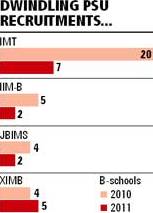Archive for the ‘PSUs’ Category
PSU executives queue up for MBAs
An MBA is no longer a cherished degree for only professionals from the private sector. An increasing number of employees from state-owned undertakings are enrolling for the degree to hone their managerial acumen, gain global exposure and fast track their career, which would have taken much longer in the public sector. In fact for most, it is a passport to move out of public sector undertakings (PSUs) to private corporations or consulting firms.
Top business schools like the Indian Institutes of Management (IIM), Indian School of Business (ISB), SP Jain Institute of Management and Research (SPJIMR), Narsee Monjee Institute of Management Studies (NMIMS University), and IIT Bombay’s Shailesh J Mehta School of Management (SJMSOM), have been witnessing significant enrolment from students with work experience in PSUs or the government sector in MBA programmes in recent times.
Public sector professionals, with two to five years of work experience, usually have exposure to large-sized projects and an MBA degree opens up for them a wider array of options in the private sector or allied industries in consulting. IIM Bangalore’s flagship post-graduate programme has 38 professionals from the government sector in the class of 2012-14 with a batch size of 377, up from 28 in the class of 2011-13, with a batch size of 382.
“Predominantly, these professionals are coming here to come out of the sector,” says professor Sankarshan Basu, chairperson, career development services at the institute. The professionals usually join the government sector from engineering campuses, but in just a few years, get frustrated at the lack of growth opportunities, he explains. “They feel an MBA degree can fetch them more glamorous roles in the corporate world, and a better remuneration,” adds Basu.
ISB’s Class of 2014 has 33 students from PSUs or government organisations, compared with 20 in Class of 2013 and seven in the Class of 2012. At SPJMIR, the PGP class of 2012-14 has 14 students from PSU sector, compared with 11 in the class of 2011-13. On an average, 7% to 8% of the PGP class over the past three years has comprised professionals from the public sector. At NMIMS, the MBA class of 2012-14 has five students from the PSU sector, compared with four in 2011-13 and two in the previous batch. Prior to this, it was hardly a trend.
“A management degree changes their entire career path. It fast-tracks their career and in the long term, they can contribute much better. It gives them crossfunctional and global exposure and trains them for long-term leadership,” says Atish Chattopadhyay, professor of marketing and deputy director of the two-year PGDM programme at SPJIMR.
At IIM Lucknow, the class of 2012-14 has 45 professionals from the government sector in a batch size of 450, up from 40 in the class of 2011-13 with a batch size of 420. Most students attribute the reasons for opting for an MBA to the slow growth opportunities in PSUs, where reaching a manager level could take them more than five to six years. Kranthi Kumar Nukathoti, former assistant design engineer at MECON, is one of them.
Nukathoti cites the lack of growth and low remuneration as factors for pursuing an MBA. He hopes to get into supply chain operations at any of the big private manufacturing majors after completing his MBA. One of the key reasons for professionals from PSUs joining SPJIMR is because of its focused specialisation in operations management, according to Chattopadhyay.
A chunk of the students from PSUs want global exposure, which the institute makes possible through its tie-up with Michigan State University in supply chain management and Purdue University in manufacturing and operations. Institutes like SJMSOM have a significant number of engineering professionals from the core sector and heavy industry PSUs coming for an MBA.
According to VK Menon, senior director, career and admissions at ISB: “An MBA degree gives them agreater choice of options and quick learning. Professionals from PSUs or government who join our MBA course get an opportunity to utilise the skills they have learnt and explore new fields.”
It’s a win-win situation as these people bring in diversity to the class and a perspective of the government sector to the rest of the students. “The exposure these people get in PSU units is large-scale,” says Menon. Adds Varsha Parab, director administration and in-charge registrar at NMIMS: “These students bring in governmental perspective to other students, which is required when they go into the corporate sector.”
Moreover, when these professionals join the private sector or consulting firms, they bring with them the skill sets and depth of understanding gained from working on big projects – a gain from the company perspective as well.
Source: The Economic Times, May 31, 2013
B-school students write off govt firms in good times
 Public sector undertakings (PSUs), which helped business schools ensure good placements in the last two years, are getting a raw treatment this year. PSUs say with the economy back on track, the students are preferring private sector companies due to fatter pay packets. PSUs and nationalised banks, with their conservative salary structures, are losing out.
Public sector undertakings (PSUs), which helped business schools ensure good placements in the last two years, are getting a raw treatment this year. PSUs say with the economy back on track, the students are preferring private sector companies due to fatter pay packets. PSUs and nationalised banks, with their conservative salary structures, are losing out.
“The private sector increasingly made its presence felt this year, unlike the previous two years, when it was playing safe. PSUs and nationalised banks have been unable to compete on compensation,” said Prakash Pathak, Chairperson (Placements), Institute of Management Technology (IMT), Ghaziabad. In 2010, around 20 public sector companies visited IMT. This year, the number is seven.
While PSU banks such as Central Bank of India and Oriental Bank of Commerce are offering students Rs. 5-600,000 per annum, private banks like Citibank, Axis, ICICI and HDFC are paying over Rs. 1 million per annum.
The numbers are starker for Indian Institute of Management, Bangalore (IIM-B). In 2008-09, seven PSUs made 24 offers. This year, two PSUs have made two offers. Five PSUs offered 16 jobs last year. “Not only are PSUs and nationalised banks reducing recruitment, the students’ preferences are also shifting towards the private sector,” said Sapna Agrawal, Head – Career Development, IIM-B.
PSUs such as Bharat Petroleum Corporation, Hindustan Petroleum Corporation, GAIL, IOCL, NTPC, SBI Cap, SIDBI, SEBI, United Bank of India and Union Bank of India, which picked up the highest number of students from IIM-Ahmedabad (I IM-A) in 2009, have recruited from other B-schools in good numbers this year. M.V. Nair, Chairman & Managing Director, Union Bank of India, said, “Now that the economy is picking up, we have not been able to pick up as many students from IIMs. They are preferring private sector companies.”
IM-A) in 2009, have recruited from other B-schools in good numbers this year. M.V. Nair, Chairman & Managing Director, Union Bank of India, said, “Now that the economy is picking up, we have not been able to pick up as many students from IIMs. They are preferring private sector companies.”
In 2009, PSUs and banks made good the gap left by the private sector due to economic slowdown. B-schools saw a 20-50 per cent increase in government companies visiting campuses. They recruited 40 students from IIM-A this year, with Union Bank among the top recruiters.
At Mumbai’s Jamnalal Bajaj Institute of Management Studies (JBIMS), only the Reserve Bank of India and Union Bank of India took part in final placements this year. In 2009, the institute was visited by 18 PSUs. Bank of Baroda, GAIL, ONGC, HPCL, SEBI, NISM and Union Bank of India were among the major PSU recruiters. About 17 per cent of the batch preferred to work with PSUs. In 2010, only four PSU came, according to the institute’s website. “We invited companies depending on student preferences. Many of them want to work with private sector companies,” said a JBIMS placement committee member. B-schools said PSUs would do well to go the private sector way.
“While PSU compensation packages may not be higher than those in the private sector, they tend to fail in terms of presentation. Private companies, on their part, make their packages lucrative by presenting them well to students. Moreover, this year there has been an increased inclination among students towards the private sector,” said a placement committee member at Xavier’s Institute of Management, Bhubaneswar.
Source: Business Standard, May 11, 2011

